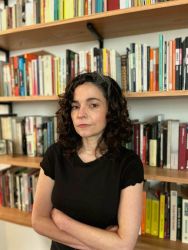This event explores the central role of emotions and affects as political, collective, and historically situated forces that shape feminist mobilizations, experiences of violence, and processes of knowledge production. By focusing on these distinct yet intertwined aspects, we invite interdisciplinary and transnational dialogue on how feelings—such as fear, shame, and numbness—circulate within feminist movements and within the research practices that engage with gender-based violence.
How do affects inform the ethics, methodologies, and epistemologies of feminist scholarship? What does it mean to feel resistance, and how might feelings be understood not only as objects of inquiry but also as modes of knowing?
These questions will first be addressed in a discussion between Ana Cecilia Gaitán (UNSAM, Buenos Aires, Argentina), Lilian Hümmler and Stella Schäfer (Goethe University, Frankfurt a.M., Germany), whose work engages with emotions and affects in the context of public policy, feminist movements and gender-based violence. This dialogue, moderated by Mahza Amini (Goethe University, Frankfurt a.M., Germany), will be followed by an informal exchange, knowledge-sharing, and collective reflection across disciplinary and methodological boundaries.
Mahza Amini holds a Master's degree in Sociology from Goethe University Frankfurt and is currently pursuing a Master's in Political Theory. She is active in feminist organizing and political education. Her research interests include feminist social theory, Critical Theory, and qualitative social research.

Ana Cecilia Gaitán is a feminist anthropologist. She holds a PhD in Anthropology from the University of Buenos Aires (UBA) and has been a visiting scholar at the Colegio de la Frontera Norte in Mexico and at Johns Hopkins University (JHU) in the US. Gaitán is currently a DFG Mercator Fellow at the Research Training Group "Doing Transitions. The Formation of Transitions over the Life Course" (Goethe University, Frankfurt am Main and Eberhard Karls University, Tübingen). She is a researcher and a professor at the National University of San Martín (UNSAM), where she leads the Program of Social Studies in Gender, Childhood and Youth. Her research interests focus on youth policies, participation, gender, violence, and feminism.
Lilian Hümmler is a sociologist who works as a research assistant at the Institute of Sociology at Goethe University Frankfurt. For her PhD project, based at the University of Kassel and the Technical University of Dortmund, Lilian Hümmler is examining the relationship between sexualized violence and shame. She has been a visiting scholar at the University of Buenos Aires (UBA) and at the National Autonomous University of Mexico (UNAM). Her research interests include feminist-materialist social theory, sexuality and violence, affect sociology, and gender in far-right movements.

Stella Schäfer is a sociologist and is conducting her PhD in the DFG Research Training Group “Doing Transitions. The Formation of Transitions over the Life Course”. Previously, she studied Human Geography in Erlangen-Nuremberg, Mankato Minnesota, Frankfurt am Main as well as in Mexico City. During her studies she completed the certificate program Women’s and Gender Studies of the Cornelia Goethe Center. She was involved in research projects on gendered violence and women’s shelters at the Department of Social Work and Health at Frankfurt University of Applied Sciences. Stella Schäfer’s research focuses on violence in gender relations, emotions, space and transition research.
The CGC strives to make its events as accessible as possible. If you require assistance to participate in our event, please inform us of your need for support by 22 September 2025 by email to cgcentrum@soz.uni-frankfurt.de. We will then endeavor to reduce the barriers that have arisen as far as possible.
You are welcome to attend this event with your children. Please contact our email address above by 22 September 2025 if you would like us to see whether we can make childcare during the event possible. We look forward to your participation.
